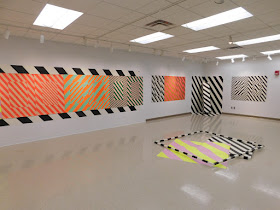Of Place and Planes
By Tom Wachunas
“But, after all, the aim of art is to
create space - space that is not compromised by decoration or illustration,
space within which the subjects of painting can live.” - Frank Stella
“A painter is a choreographer of
space.” - Barnett Newman
EXHIBIT: MULTI – by Natalie Lanese / THROUGH
APRIL 6 at Main Hall Art Gallery / Kent State University at Stark, 6000 Frank
Avenue NW, North Canton, Ohio / Viewing hours are Monday – Friday 11 A.M. to 5 P.M.
(closed during Spring Break, March 26 – April 1)
Back in 1959, Frank
Stella’s seminal ‘black paintings’ knocked the art world for a loop. More than
a few passionate purveyors of abstract expressionism regarded his bleak,
so-called minimalist surfaces as the death of art. Stella’s assessment? “What
you see is what you see.” It’s not too unreasonable
that we would regard his statement as deliberately smug and elliptical. But we
can and should just as well take it as throwing down a gauntlet – a challenge
to deconstruct and re-configure the broader processes of making, presenting,
and seeing a painting.
Natalie Lanese is a
resident of Toledo, Ohio, and Associate Professor of Art and Gallery Director
at Siena Heights University in Adrian, Michigan. Her current installation at
Kent Stark’s Main Hall Art Gallery certainly lives up to its name – Multi – in how it playfully explores and
crosses multiple formal boundaries (painting/collage/sculpture).
Playful indeed, at
least initially, there’s something momentarily disorienting in how Lanese’s
paintings on paper are so insistent, so in-your-face loud while quietly
seething with perceptual ambiguities of spatial depth and figure-ground
dynamics. Their sleek, commercially-
printed look (from a distance) disappears on close examination. This is flat
house paint, applied by hand. The surfaces have a subtly gestural immediacy. Their flirtation with optical illusions or
flickerings of ghostly after-images makes the whole gallery space pulse and
sway.
A substantial
portion of the exhibit is given over to multiple paintings joined in a
continuous band, in turn mounted on top of black or orange diagonal stripes
painted directly on to the gallery wall. The white gallery walls are no longer
an incidental architectural backdrop, but now an integral part of a vast
sculptural/pictorial collage. In other passages, the paintings break with
traditional display protocol, casually curving away from the wall, their bottom
portions jutting out and resting on the floor. It’s really a benevolent
invasion of our psychological space - a literal undermining of our
predispositions and assumptions about our sense of place as viewers in a
gallery environment.
You might think
something like, “Wait a minute. I need this floor to be a floor, my spot to be
grounded and stable as I look straight ahead at art on a wall.” But your eyes start darting about in a
zig-zagging manner, retracing the patterns of those colors, those bold colors
so intensely present that you feel
pushed, pulled, maybe even punched. You can’t help but see the ceiling,
noticing its gridded rhythms of tiles punctuated by repeating lines of lights,
their soft reflections, along with those of the paintings, seemingly puddled on
the floor. No, not on the floor, but
somehow underneath it. Suddenly, this kinetic sensation of floating, or being
immersed, makes you an active participant in a bright theatre of intersecting
planes, a partner in a performance.
Lanese has
choreographed a glowing gauntlet – an integrated retinal, psychological, and
conceptual experience. She’s invited us to not just see what we see, but to
dance with it.






No comments:
Post a Comment